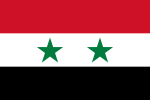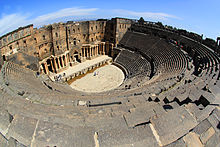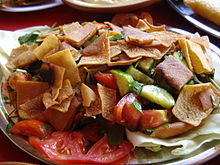Culture of Syria
| Part of a series on the |
| Culture of Syria |
|---|
 |
| History |
| People |
| Languages |
| Cuisine |
| Religion |
|
Art |
|
Literature |
| Music |
|
Sport |


The scribes of the city of Ugarit (modern Ras Shamra) created a cuneiform alphabet in the 14th century BC. The alphabet was written in the familiar order we use today like the English language, however with different characters.[3]
Archaeologists have discovered extensive writings and evidence of a culture rivaling those of
.Literature

Syrians have contributed to
In 1948, the partitioning of neighbouring Palestine and the establishment of Israel brought about a new turning point in Syrian writing. Adab al-Iltizam, the "literature of political commitment", deeply marked by social realism, mostly replaced the romantic trend of the previous decades. Hanna Mina, rejecting art for art's sake and confronting the social and political issues of his time, was arguably the most prominent Syrian novelist of this era. Following the Six-Day War in 1967, Adab al-Naksa, the "literature of defeat", grappled with the causes of the Arab defeat.
The
Poetry
Syria has always been one of Arabic poetry's centers of innovation and has a proud tradition of oral and written poetry. It has contributed to Arabic poetry mostly in the classical and traditional Arabic genres with influence from the French Romantic influences brought to the country while under French rule.
One of the most prominent Syrian poets include Badawi al-Jabal, whose poetic style was classical Arabic prose, based on the Abbasid-era tradition.[8] His work is mostly influenced to some extents by his experience of exile, poverty and political activism,[8] and he's considered to be "one of the greatest poets of the old school".[8]
Another prominent Syrian poet was
Music
Syria's capital,
Syria's folk music is for the most part based on the oud, the ney and lap-held drums, with little if any vocal accompaniment.[14] In Nomadic regions, Bedouin music which is based on the Mizmar and Rebab is popular.
Modern Syrian music notably contrasts folk music. It uses an orchestra of mostly European instruments with one lead vocalists and a backup chorus.[14] This type of music is widespread, especially among young people, including Assala Nassri, Farid al-Atrash, Fahd Ballan, Sabah Fakhri, Mayada El Hennawy, Rushwan al-Deek and George Wassouf.[15]
Syria was one of the earliest centers of Christian
One of the most popular dances in Syria is the Dabkeh, a folk dance combining circle dancing and line dancing formed from right to left and headed by a leader which alternates between facing the audience and other dancers. It is mostly performed at weddings and other joyous occasions. Other popular folklore dances include the "Arāḍa" (Arabic: عراضة), a dance performed with swords as well as oriental dance for women.
Architecture
Traditional Houses of the Old Cities in Damascus, Aleppo and some other Syrian cities are preserved and traditionally the living quarters are arranged around one or more courtyards, typically with a fountain in the middle supplied by spring water, and decorated with citrus trees, grape vines, and flowers.[2]
One of the most notable examples of the traditional
Outside of larger city areas such as Damascus, Aleppo or Homs, residential areas are often clustered in smaller villages. The buildings themselves are often quite old (perhaps a few hundred years old), passed down to family members over several generations. Residential construction of rough concrete and blockwork is usually unpainted, and the palette of a Syrian village is therefore simple tones of grays and browns.[18]
Media
There was a private sector presence in the
The authorities operate several intelligence agencies
Cuisine

Syrian cuisine is rich and varied in its ingredients and is linked to the regions of Syria where a specific dish has originated. Syrian food mostly consists of Southern Mediterranean, Greek, and Southwest Asian dishes. Some Syrian dishes also evolved from Turkish and French cooking. Dishes like
The main dishes that form Syrian cuisine are
.
Syrians are also well known for their
Drinks in Syria vary depending on the time of day and the occasion.
Sports

The most popular sports in Syria are
Although the
Although Syria has never qualified for the World Cup finals, its national football team reached the fourth round in 2018 after tying with Iran. They tied with the Australian team on the 5th of October before losing to them 2-1 on the 10 October and disqualifying. A win would have seen them play Honduras in an intercontinental playoff, if they won that, they would have qualified for the 2018 FIFA World Cup
The highest division of football in Syria is the Syrian Premier League which began to play in 1966. The league's champion is Al-Jaish SC, based in Damascus.
Fairs and festivals
| Festival/Fair | City | Date |
|---|---|---|
| Spring Festival of Hama | Hama | April |
| Flower Festival(معرض الزهور) | Latakia | April |
| Assyrian New Year Festival | Qamishli | April |
| Nowruz Kurdish New Year Festival | Qamishli | 21 March |
| Traditional Festival | Palmyra | May |
| International Flower Fair | Damascus | May |
| Syrian Song Festival(مهرجان الأغنية السورية) | Aleppo | July |
| Marmarita Festival | Homs | August |
| Joy in God, Murshdi festival | 25 August | |
| Festival of le Valley for Arts&Culture
|
Homs | August |
| Vine Festival | As Suwayda
|
September |
| Cotton Festival | Aleppo | September |
| Damascus International Fair | Damascus | September |
| Festival of Love and Peace | Lattakia
|
2–12 August |
| Bosra Festival | Bosra | September |
| Film and Theatre Festival | Damascus | November |
| Cultural Festival of Jableh | Jableh | July |
| Jasmine Festival | Damascus | April |
References
- ISBN 0-04-445039-7.
- ^ ISBN 0-253-21722-9.
- ISBN 0-393-00275-6.
- ^ An up-to-date account for the layman, written by the head of the archaeological team that uncovered Ebla is Paolo Matthiae, The Royal Archives of Ebla (Skira) 2007.
- ^ Plutarch, Cicero, c. 4; Lucullus, c. 4; Cicero, Academica, ii. 19.
- ^ Chisholm, Hugh, ed. (1911). . Encyclopædia Britannica. Vol. 22 (11th ed.). Cambridge University Press. p. 172.
- ^ "OCA » Syrian Arab Republic". ocasia.org. Archived from the original on 10 August 2021. Retrieved 10 August 2021.
- ^ ISBN 9781134713769.
- ^ Darwish, Adel (5 May 1998). "Obituary: Nizar Qabbani". The Independent.
- ^ "Nizar Qabbani: From Romance to Exile", Muhamed Al Khalil, 2005, A dissertation submitted to the faculty of the Department of Near Eastern Studies in partial fulfilment of the requirements for the degree of Doctor of Philosophy in the Graduate College of the University of Arizona, USA.
- ^ a b c d "Nizar Qabbani". PoemHunter.com. Retrieved 23 June 2007.
- ^ "Традиционное искусство пения в контексте современного музыкального образования сирии". cyberleninka.ru. Retrieved 25 July 2022.
- ^ "المعهد العالي للموسيقا". him-damascus.com. Retrieved 25 July 2022.
- ^ ISBN 9780761420545.
- ^ "Music of Syria". Traditional Arabic music. Archived from the original on 30 November 2017. Retrieved 12 December 2017.
- ISBN 9781858287188.
- ISBN 0-292-70680-4.
- ISBN 0-7914-0713-6.
- ^ "Blocking of Syrian television is justified". The National. Retrieved 26 August 2012.
- ^ "Syrian president to address parliament in 1st speech since January - 6/3/2012 2:36:55 AM | Newser". Archived from the original on 4 March 2021. Retrieved 12 December 2012.
- ISBN 1-892494-70-1.
- ^ "more than one dozen intelligence agencies" source: Wright, Robin, Dreams and shadows, the Future of the Middle East, Penguin Press, 2008, p.214
- ^ "hundreds of thousands of mukhabarat" according to dissident Riad Seif source: Wright, Robin, Dreams and shadows, the Future of the Middle East, Penguin Press, 2008, p.230
- ^ "Damascus". RTÉ. 15 October 2009. Archived from the original on 4 December 2009. Retrieved 26 November 2009.
Sources
- Zuhur, Sherifa (2000), Asmahan's Secrets: Woman, War, and Song, University of Texas Press, ISBN 978-0-292-79807-6
